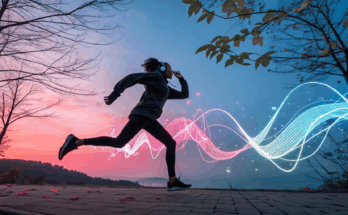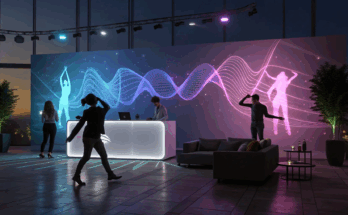As an aspiring music producer, I often find myself caught in a whirlwind of sounds, beats, and melodies, all while trying to carve out my niche in an industry that seems to evolve faster than I can say “drop the bass.” Enter artificial intelligence, or AI, which has become the new buzzword in the music world. It’s as if the universe decided that my dreams of producing chart-topping hits needed a little technological boost. I remember the first time I heard about AI in music; I was at a local café, sipping on a latte that cost more than my last vinyl purchase.
A fellow producer leaned over and said, “Dude, have you heard about this AI that can compose symphonies?” I nearly choked on my overpriced drink. The thought of a machine creating music was both thrilling and terrifying. Could it really be true?
AI is not just a futuristic concept; it’s already here, reshaping how we create, produce, and consume music. From algorithms that analyze listener preferences to software that can generate entire tracks, AI is becoming an integral part of the music landscape. It’s like having a supercharged assistant who never sleeps and can churn out ideas faster than I can hit the record button.
But as I dive deeper into this world, I realize that while AI can enhance creativity, it also raises questions about authenticity and artistry. Can a machine truly understand the emotional nuances of music? Or will it forever remain a clever mimic, lacking the soul that human musicians pour into their work? Learn more about music production with our online course.
Key Takeaways
- AI is revolutionizing the music industry by transforming the way music is produced, composed, curated, recommended, and performed.
- AI in music production is streamlining the process by automating tasks such as mixing, mastering, and sound design, leading to increased efficiency and creativity.
- AI in music composition is enabling the generation of original music pieces, helping artists overcome creative blocks and explore new musical styles.
- AI in music curation and recommendation is personalizing the music listening experience by analyzing user preferences and behavior to suggest relevant music.
- AI in music performance is enhancing live performances through technologies like virtual artists and interactive music systems, pushing the boundaries of creativity and audience engagement.
AI in Music Production
The Early Days of Music Production
When I first started producing music, my setup was a hodgepodge of second-hand gear and free software. I remember spending hours tweaking knobs and adjusting levels, trying to get that perfect sound.
The Rise of AI in Music Production
Fast forward to today, and AI has entered the chat, promising to revolutionize music production. With tools like LANDR and iZotope’s Ozone, I can now master tracks with the click of a button. It’s like having a seasoned engineer in my pocket—if only he could also make me coffee.
The AI-Driven Creative Process
One day, while collaborating with a friend who’s a tech wizard, we decided to experiment with an AI-driven production tool. As we fed it samples and loops, I couldn’t help but feel like we were conducting an orchestra of ones and zeros. The AI suggested arrangements and even added effects that I would have never thought to try. “It’s like having a creative partner who doesn’t argue about royalties,” my friend joked. But as we listened to the final product, I found myself grappling with a strange feeling—was this track truly ours? Or had we simply become facilitators for a machine’s creativity?
AI in Music Composition
The idea of AI composing music is both fascinating and slightly unnerving. I mean, who wouldn’t want to sit back and let a computer write their next hit single? I once attended a workshop where an AI program was showcased that could generate melodies based on user input.
The instructor asked us to hum a tune, and within seconds, the AI produced a full orchestral arrangement. My jaw dropped. “This is how Beethoven would have sounded if he had access to GarageBand,” I thought.
However, as I watched the AI work its magic, I couldn’t shake the feeling that something was missing. Sure, it could create catchy hooks and intricate harmonies, but could it capture the raw emotion behind a heartbreak ballad or the exuberance of a summer anthem? I shared my thoughts with a fellow attendee who was equally intrigued by the technology.
“It’s like having a really smart parrot,” he said with a chuckle. “It can mimic what it hears but doesn’t truly understand the meaning behind it.” This conversation sparked a debate about the essence of music—was it merely about sound, or did it require human experience to resonate deeply?
AI in Music Curation and Recommendation
As someone who spends countless hours curating playlists for every mood imaginable—think “Chill Vibes for Rainy Days” or “Epic Workout Anthems”—I’ve come to appreciate how AI is transforming music curation. Platforms like Spotify and Apple Music use algorithms to analyze listening habits and suggest tracks that align with my tastes. It’s like having a personal DJ who knows me better than my best friend does.
One evening, while discussing this with another producer at an open mic night, he remarked, “AI is like that friend who always knows what you want to hear but never actually listens to you.
While AI can analyze data and predict preferences with impressive accuracy, it lacks the human touch that comes from genuine connection and understanding. As we navigated through our favorite tracks on Spotify, I realized that while AI can enhance our listening experience, it can’t replace the joy of discovering new music through shared experiences or serendipitous encounters.
AI in Music Performance
The concept of AI taking the stage is something straight out of a sci-fi movie. Imagine attending a concert where the headliner is an algorithm rather than a human artist. While it sounds far-fetched, there are already instances of AI-generated performances captivating audiences worldwide.
I once watched a live-streamed concert featuring an AI composer who created real-time music based on audience reactions. It was mesmerizing—like watching a musical chameleon adapt to its environment. However, as I sat there, clapping along with the virtual crowd, I couldn’t help but ponder the implications of such performances.
Would we eventually reach a point where human musicians are relegated to nostalgia acts while machines take center stage? A fellow concert-goer leaned over and said, “I love this! But will we ever get to hear an AI cover ‘Wonderwall’?” We both chuckled at the absurdity of it all.
While AI can create impressive compositions, there’s something irreplaceable about the energy and spontaneity that live human performances bring to the table.
Ethical and Legal Considerations of AI in Music
As I delve deeper into the world of AI in music, I find myself grappling with ethical and legal questions that seem to multiply like rabbits at an Easter egg hunt. Who owns the rights to music created by an AI? Is it the programmer who designed the algorithm or the user who provided input?
These questions swirl around my mind like an unresolved melody. During a panel discussion at a local music festival, an industry expert raised an eyebrow and said, “If an AI writes a hit song, does it get royalties? Or do we just send it some binary code as payment?” The audience erupted in laughter, but beneath the humor lay a serious concern about how we navigate this new landscape.
As someone who dreams of making it big in music, I can’t help but wonder how these developments will impact aspiring artists like myself. Will we be competing against machines for recognition? Or will we find ways to collaborate with them to create something truly unique?
The Future of AI in Music
Looking ahead, I can’t help but feel both excited and apprehensive about the future of AI in music. On one hand, the potential for innovation is staggering; on the other hand, there’s a nagging fear that we might lose touch with what makes music so special—the human experience behind it all. As I continue my journey as an amateur producer, I find myself pondering how I can leverage these advancements without losing my artistic voice.
A fellow producer once told me over coffee (the same overpriced one from earlier), “Think of AI as your creative assistant rather than your replacement.” This perspective resonated with me; instead of viewing AI as competition, perhaps it could be an ally in my quest for musical greatness. By embracing technology while staying true to my artistic vision, I can carve out my own path in this ever-evolving landscape.
The Impact of AI on the Music Industry
As I reflect on my experiences with AI in music—from production tools to composition algorithms—I realize that this technology is not just reshaping how we create and consume music; it’s also challenging us to rethink our relationship with art itself. While there are valid concerns about authenticity and ownership, there’s also immense potential for collaboration between humans and machines. In this brave new world of music production, composition, curation, performance, and beyond, one thing is clear: AI is here to stay.
As an ambitious male amateur music producer navigating this landscape, I’m determined to embrace these changes while staying true to my passion for creating meaningful music. After all, whether it’s crafted by human hands or generated by algorithms, at its core, music remains a universal language that connects us all—one beat at a time.
If you’re interested in exploring how technology is shaping the future of music, you may also enjoy reading The Evolution of Music: How Technology Is Shaping the Future of Sound. This article delves into the ways in which advancements in technology are influencing the creation and consumption of music, offering a fascinating look at the intersection of art and innovation.
FAQs
What is AI in the context of music?
AI, or artificial intelligence, refers to the use of computer systems to perform tasks that normally require human intelligence, such as learning, reasoning, and problem-solving. In the context of music, AI can be used to create, compose, and produce music.
How is AI changing the way we make music?
AI is changing the way we make music by providing tools and technologies that can assist musicians and composers in the creative process. AI can analyze large amounts of musical data, generate new musical ideas, and even mimic the style of famous composers.
What are some examples of AI being used in music production?
Some examples of AI being used in music production include AI-powered music composition tools, virtual instruments that can mimic the sound of real instruments, and AI algorithms that can analyze and categorize music based on its characteristics.
What are the potential benefits of using AI in music production?
The potential benefits of using AI in music production include increased efficiency in the creative process, access to new and innovative musical ideas, and the ability to explore and experiment with different musical styles and genres.
Are there any concerns or drawbacks associated with using AI in music production?
Some concerns associated with using AI in music production include the potential for AI to replace human musicians and composers, issues related to copyright and ownership of AI-generated music, and the ethical implications of using AI to mimic the style of famous composers.



